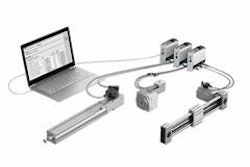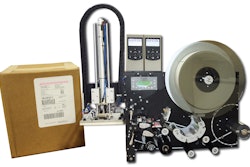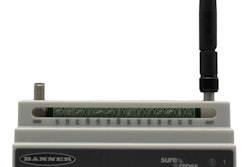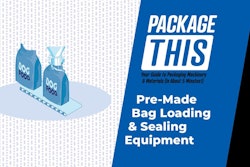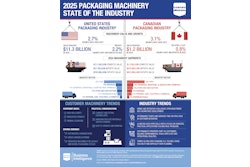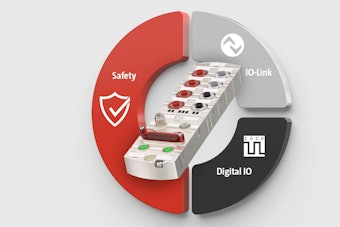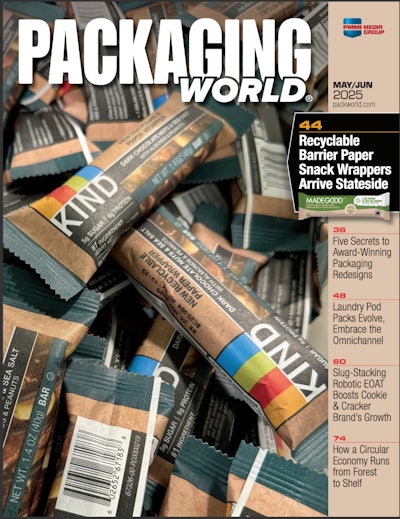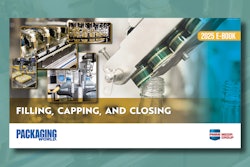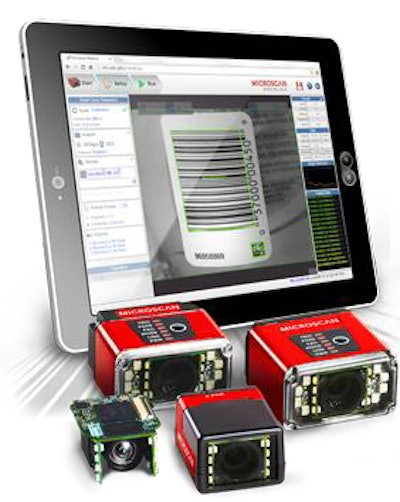
This content was written and submitted by the supplier. It has only been modified to comply with this publication’s space and style.
Part of the revolutionary MicroHAWK platform launched in September 2015, Microscan introduced WebLink as the first-ever web-based barcode reader interface. WebLink software is stored on the MicroHAWK barcode reader, rather than external equipment. The WebLink interface is accessed through a web browser by navigating to the barcode reader’s IP address using any web-enabled device on the local area network (LAN). WebLink’s open-protocol framework eliminates integration hassle and device incompatibility across factory networks, IT equipment, and control systems. Since no software is installed on equipment used to control MicroHAWK readers, WebLink does not require the intervention of IT to facilitate installation or upgrades. In addition, custom reader settings can be saved as WebLink job files to the MicroHAWK reader’s internal memory or to external devices and are completely portable to new integration environments and equipment.
Today, Microscan announces the release of WebLink 1.1, the first upgrade of the company’s WebLink interface. WebLink updates greatly expand the flexibility of MicroHAWK to meet custom needs in barcode reading for product identification, tracking, traceability, and guidance in industries from clinical instrumentation, to packaging, to electronics manufacturing. Notably, WebLink 1.1 supports the all-new integrated liquid lens autofocus hardware option available in the MicroHAWK ID-30 and ID-40 barcode imagers. Users can select a MicroHAWK ID-30 or ID-40 unit with autofocus to read barcodes at distances from 2 in. (50 mm) to 12 in. (300 mm), with potentially infinite-focus flexibility. While fixed focus models are factory-configured to decode at set focal distances, new autofocus models offer both true autofocus and software-programmable focus. From the intuitive WebLink interface, users can enable and disable the Autofocus feature by simply clicking the Autofocus button in the tool bar. Enabling Autofocus commands readers to continuously search for symbols at various focal distances within their fields of view (FOV), or set fixed focal distances using either spot focus functionality or manually setting focal distance in inches or millimeters. Enabling Autofocus from a continuous read or presentation mode commands the MicroHAWK reader to begin automatically searching for symbols, refocusing after every five “no-read” results. While in continuous read, triggered, or presentation modes, users can use spot focus to click anywhere within the live view captured by the MicroHAWK reader to auto-set the focal distance for specific symbol locations.
WebLink 1.1 also introduces field-upgradable speed and decoding capabilities for MicroHAWK. This feature allows users to request license upgrades directly from the WebLink interface to unlock unlimited speed (up to 60 frames per second) and decoder options from Standard (1D barcodes only), Plus (high-contrast 1D and 2D symbols), and X-Mode (Microscan’s advanced decoding algorithms for reading damaged symbols and direct part marks). Field upgradability empowers users to meet a diverse range of application requirements even when the parameters of a barcode reading job change, from application speeds to the introduction of new symbol types or parts. To perform a license upgrade, users simply navigate to the License Options menu in the WebLink interface, select their preferred licenses, and an email request is auto-generated and sent to Microscan from the software requesting the purchase of a license key. Once license files are received, these files can be selected in the License Options menu in WebLink to instantly unlock the requested speed or decoder settings.
Expanding the accessibility of data acquired by MicroHAWK readers, the new WebLink 1.1 features image storage capability for use in record-keeping or audit purposes. Images captured by readers can be saved by enabling a simple FTP Server and choosing a storage location via RAM or FTP. The user can then select which images to save (good reads, no reads, all images, or specific images within a read cycle), image quality, image scale, and storage locations. WebLink 1.1 also supports new HID USB keyboard output for USB MicroHAWK Readers (ID-20 and ID-30 units), which outputs encoded barcode data as human-readable text strings to common word-processing and spreadsheet programs such as Microsoft® Word®, Excel®, and Notepad.
Users with existing MicroHAWK Barcode Readers can now update their devices to new WebLink 1.1 using Microscan’s ESP® (Easy Setup Program) Software and then upgrading to the latest revision of WebLink firmware, available on the Microscan Download Center. To access MicroHAWK’s autofocus features, users must purchase a MicroHAWK unit with integrated autofocus lens, now available for order.



